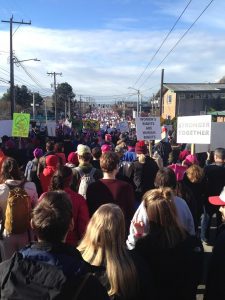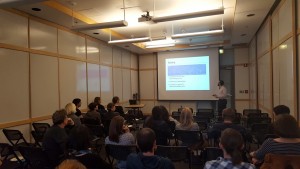Last week, UW’s physics department hosted a seminar by Rachel Scherr, a UW physics alumna and senior research scientist at Seattle Pacific University who has also conducted research on diversity and education for the American Physical Society (APS). This discussion was prompted in part by the lack of diversity in this year’s cohort of physics graduate students: of 31 students, 30 identify as male. While the demographics of our chemistry department are much more balanced in terms of gender, the topic of diversity in admissions is important for anyone interested in graduate education.
Category Archives: Reflections
Women’s March
On January 21, 2017, several groups of students from the Chemistry department and WCS participated in the Women’s March to support women and their human rights. Rachel Boccamazzo, a senior biochemistry and biology undergraduate, provided an image, showing a small sample of the amount of individuals who were present on Jackson street.
View from Jackson street towards downtown
Fun video by Anita Sarkeesian about Ada Lovelace
We here at WCS loooove Ada Lovelace. We also looove Anita Sarkeesian (and hosted her at UW this past January)!
What better than a youtube video about Duchess Lovelace presented BY Anita Sarkeesian? Enjoy!
Power Posing might not be all we thought it was
In November 2013, we were very privileged to host Amy Cuddy at WCS-UW. It was an all-around blast, and everyone learned a lot from our fabulous guest speaker. Many of us started using “Power Poses” regularly in our own lives.
This last January 2016, Amy Cuddy’s popular power-posing research went up against the scientific tradition of replication study. The new study couldn’t replicate the effects of power posing, though, Cuddy argues, several elements of the original 2010 study were changed.
BigThink: A New Replication Suggests ‘Power Posing’ Is a Waste of Time, but Here’s Why You’ll Still Be Told to Do It for Years to Come
Slate: The Power of the “Power Pose”: Amy Cuddy’s famous finding is the latest example of scientific overreach.
NPR: ‘Power Poses’ Co-Author: ‘I Do Not Believe The Effects Are Real’
What do you think, clever scientists? How much faith should we put in power posing? Will you still be using it in your personal life?
UW Nobel Laureate
We’re delighted that a UW professor was awarded the 2016 Nobel Prize in physics, but are disappointed at the committee’s alarming trend of only awarding the prize to men.
https://www.washingtonpost.com/news/speaking-of-science/wp/2016/10/04/its-been-53-years-since-a-woman-won-the-nobel-prize-in-physics-whats-the-hold-up/
Women Crack the academic glass ceiling
This week’s C&E News features an article entitled “Women crack the academic glass ceiling” on the increased representation of women among chemistry faculty at major research universities, according to surveys conducted by OXIDE, the Open Chemistry Collaborative in Diversity Equity. Though the percentage of women professors is still only 19.1%, this represents an improvement over the last survey and an encouraging trend. The article also includes interviews with several professors (including Christy Haynes, who gave a talk for WCS in fall 2014!) on how their departments are improving diversity and what else can be done.
Recap: Dan Grunspan, UW Anthropology, on Gender Bias amongst Undergraduates in STEM Courses
Hi folks! Happy Memorial Day. Here’s my take on Dan Grunspan’s talk, titled “Old Boys’ Club Starts Early: Males Under-Estimate Academic Performance of Their Female Peers in Undergraduate Biology Classrooms.” After I give my two cents, I’ll provide some cool links! Some notes: Dan’s research differentiated between people using the words “male” and “female.” In order to stay true to his analysis, I will do the same (even though gender is a spectrum and male and female are technically references to “biological sex,” whatever that is).
Lunch discussion: How do people react to reports of gender bias in STEM fields?
Our lunch discussion series (Thursdays at noon in CHB 339) continues! Contact me (hdnelson at uw.edu) or Teresa (tmheard at uw.edu) if you’d like to join our email list or access the schedule, or if you have a topic suggestion.
This week, we talked about a recently published study (Handley, Brown, Moss-Racusin, Smith; PNAS 2015, 112, 13201-13206) investigating how people react to evidence of gender bias. The authors showed that men view studies demonstrating gender bias less favorably than women do, a finding which has important implications for anyone interested in combating bias in STEM fields.
WCS presents: Women in STEM lunches
WCS-UW is kicking off a new event this year that we’re really excited about! Every week we plan to host a casual discussion on a wide variety of Women in STEM topics. Your hosts, Heidi and I, plan on covering anything from how the scientific community is responding to the latest uproar to the newest research on gender biases in STEM, and everything in between. We’re meeting on Thursdays from 12:00-1:30 in CHB 339. Don’t worry if you miss some weeks, we’ll be updating this blog with summaries of the articles and our reactions to them.
Happy Birthday to Emmy Noether
As you may have seen on Google’s page, this March 23rd marks what would have been Emmy Noether’s 133rd birthday. If you hadn’t heard of Emmy Noether before, you’re not alone (I hadn’t either); it just goes to show how easy it is for scientists to be lost to time even when their discoveries aren’t. So let’s take a look at Emmy Noether’s contributions to science/math.
Emmy Noether was born in Germany on March 23rd, 1882. As a child, she was not noted for being academically gifted, although family friends remarked on her talent for solving logic puzzles. She studied at the University of Erlangen, which, in addition to only having 2 female students out of almost a 1000 total, only allowed her to audit classes. In spite of this, Dr. Noether would eventually successful complete a dissertation in mathematics in 1907. After being introduced to the work of David Hilbert, she began her first forays into abstract algebra. David Hilbert went on to get her a teaching position at his university, although the school would not pay her and only referred to her as his assistant. She eventually received recognition of her status of a professor, along with a small salary. Unfortunately, as in too many histories of German scientists, the rise of the Nazi party in Germany came with the expulsion of Jewish professors from their posts. Although Dr. Noether continued to meet with students to discuss mathematics, she eventually left Germany for a paid position at Bryn Mawr College, where she worked until her death in 1935.
Much as it pains me to admit, I cannot hope to properly explain Emmy Noether’s contributions to the field of abstract algebra, particularly non-commutative algebra (where the commutative property no longer applies). Suffice to say, her contributions to mathematics and theoretical physics helped theoretical mathematics to become a field of study, and are still being used today. So happy 133rd birthday to Dr. Noether!

